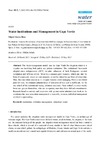Identificador persistente para citar o vincular este elemento:
https://accedacris.ulpgc.es/jspui/handle/10553/70870
| Campo DC | Valor | idioma |
|---|---|---|
| dc.contributor.author | Suárez Bosa, Miguel | en_US |
| dc.date.accessioned | 2020-03-13T09:56:37Z | - |
| dc.date.available | 2020-03-13T09:56:37Z | - |
| dc.date.issued | 2015 | en_US |
| dc.identifier.issn | 2073-4441 | en_US |
| dc.identifier.uri | https://accedacris.ulpgc.es/handle/10553/70870 | - |
| dc.description.abstract | The water-management model used in Cape Verde for irrigation water is a singular one involving both public and private institutions. The institutional framework adopted since independence (1975) includes influences of both Portuguese colonial occupation and African culture. Water is a common-pool resource, which can take the form of communal, private or state property, or not be subject to any form of ownership. Thus, this case study enables us to compare theories about managing. From a neo-liberal point of view, the common administration of resources of this kind is inefficient, but for one school of the institutional theory, solutions can come "from within" in other words, from user groups themselves, who can co-operate, once they have defined commitments. Research based on surveys and interviews with private sector administrators leads to the conclusion that user association management is successful, whereas, individual management can lead to squandering. | en_US |
| dc.language | eng | en_US |
| dc.relation.ispartof | Water (Switzerland) | en_US |
| dc.source | Water (Switzerland) [ISSN 2073-4441], v. 7 (6), p. 2641-2655 | en_US |
| dc.subject | 5309 Organización industrial y políticas gubernamentales | en_US |
| dc.subject.other | Institutions | en_US |
| dc.subject.other | Evolution | en_US |
| dc.subject.other | Management | en_US |
| dc.subject.other | Technology | en_US |
| dc.subject.other | Water | en_US |
| dc.title | Water institutions and management in Cape Verde | en_US |
| dc.type | info:eu-repo/semantics/Article | en_US |
| dc.type | Article | en_US |
| dc.identifier.doi | 10.3390/w7062641 | |
| dc.identifier.scopus | 84938689855 | - |
| dc.identifier.isi | 000361033700005 | |
| dc.contributor.orcid | #NODATA# | - |
| dc.contributor.authorscopusid | 53563330100 | |
| dc.description.lastpage | 2655 | - |
| dc.identifier.issue | 6 | - |
| dc.description.firstpage | 2641 | - |
| dc.relation.volume | 7 | - |
| dc.investigacion | Ciencias Sociales y Jurídicas | en_US |
| dc.type2 | Artículo | en_US |
| dc.contributor.daisngid | 6004272 | |
| dc.description.notas | This article belongs to the Special Issue Study, Development and Management of Water in Volcanic Areas | en_US |
| dc.description.observaciones | The author gratefully acknowledges the constructive comments and suggestions from the anonymous reviewers. This work has been partially supported by a The “«TituloProyecto»” (Oceánidas), was made in the context of the SEMACA (Senegal, Mauritania and Cape Verde), this co-cooperation project was funded by the European Union as part of the MAC Project, 2007–2013. It was implemented between January 2012 and December 2013. We are grateful to the Centro Universitario de Cooperación Internacional (CUCI) from the Universidad de Las Palmas de Gran Canaria (ULPGC) for their support. | en_US |
| dc.utils.revision | Sí | en_US |
| dc.contributor.wosstandard | WOS:Bosa, MS | |
| dc.date.coverdate | Enero 2015 | |
| dc.identifier.ulpgc | Sí | es |
| dc.description.sjr | 0,522 | |
| dc.description.jcr | 1,687 | |
| dc.description.sjrq | Q1 | |
| dc.description.jcrq | Q2 | |
| dc.description.scie | SCIE | |
| item.grantfulltext | open | - |
| item.fulltext | Con texto completo | - |
| crisitem.author.dept | GIR IATEXT: Documentación, Patrimonio e Historia Atlántica | - |
| crisitem.author.dept | IU de Análisis y Aplicaciones Textuales | - |
| crisitem.author.orcid | 0000-0001-8641-0948 | - |
| crisitem.author.parentorg | IU de Análisis y Aplicaciones Textuales | - |
| crisitem.author.fullName | Suárez Bosa,Miguel | - |
| Colección: | Artículos | |
Citas SCOPUSTM
3
actualizado el 08-jun-2025
Citas de WEB OF SCIENCETM
Citations
4
actualizado el 01-mar-2026
Visitas 5
53
actualizado el 10-ene-2026
Descargas
74
actualizado el 10-ene-2026
Google ScholarTM
Verifica
Altmetric
Comparte
Exporta metadatos
Los elementos en ULPGC accedaCRIS están protegidos por derechos de autor con todos los derechos reservados, a menos que se indique lo contrario.
